The washing machine is a very useful appliance used in most households, it can be alarming when this reliable machine takes an unexpected turn and begins smoking inside, leaving homeowners concerned about the safety of their appliance, their homes, and the potential risks to their family’s health.
In this article, everything you need to know about washing machine-related issues will be explained in detail as we explore “Washing machine smoking”.

Causes of smoke in your washing machine
Smoke coming from your wall outlet, wash basket, or any other part of your washing machine can be due to countless reasons, and possible situations, and their solutions are examined below.

Overloaded drum
An overloaded drum in load washers can lead to smoking and potentially cause damage to the washing machine, a careful balance of motion and weight distribution is required for a washing machine to function.
It’s essential to identify an overloaded washing machine before it starts to smoke and check the rotation of the washing machine, the drum may not rotate as freely as it should during the spin cycle due to the excess weight.
Due to increased friction and strain on the washing machine’s parts, an overloaded drum may make more noise than usual, and vibrations brought on by overloading may even force the equipment to shift from its position.
Clothes may also not be cleaned properly due to inadequate space for movement and water circulation.
To prevent your washing machine from emitting smoke due to an overloaded drum, remove excess clothes from the washing machine to ensure it doesn’t exceed its limit.
Properly distribute the clothes evenly around the drum, and avoid clumping heavy items together, as this can exacerbate the imbalance.
Check for any signs of damage to the drum, suspension system, drive motor, or other components.
If you notice any issues like a faulty drive motor or a damaged idler pulley, consider calling a professional technician to assess and repair the damage.
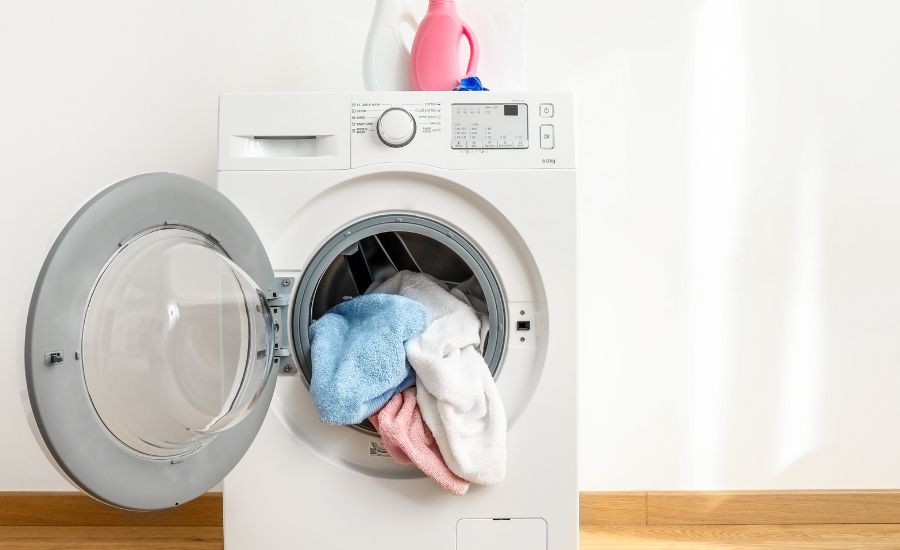
Blocked ventilation
When a washing machine is in use, heat is produced, particularly in the engine and electrical parts, to avoid overheating, this heat must evaporate, and the machine’s internal temperature rises as a result of the hot air becoming trapped, leading to smoke coming from the washer or washing machine.
The heat buildup caused by blocked ventilation can affect rubber seals and plastic parts within the washing machine.
These materials may start to degrade, emit odors, and eventually produce smoke.
It’s important to recognize signs of a blocked ventilation system, so you can act before it starts smoking a burning rubber smell during or after a spin cycle.
This burning smell or smoke coming from the washing machine suggests overheating, clothes will not be cleaned effectively due to the compromised performance of the washing machine.
To resolve this issue, ensure that your washing machine is correctly installed with adequate space around it to allow for proper airflow.
Verify that there are no obstructions, like walls, furniture, or clothes, blocking the ventilation openings in the washing machine.
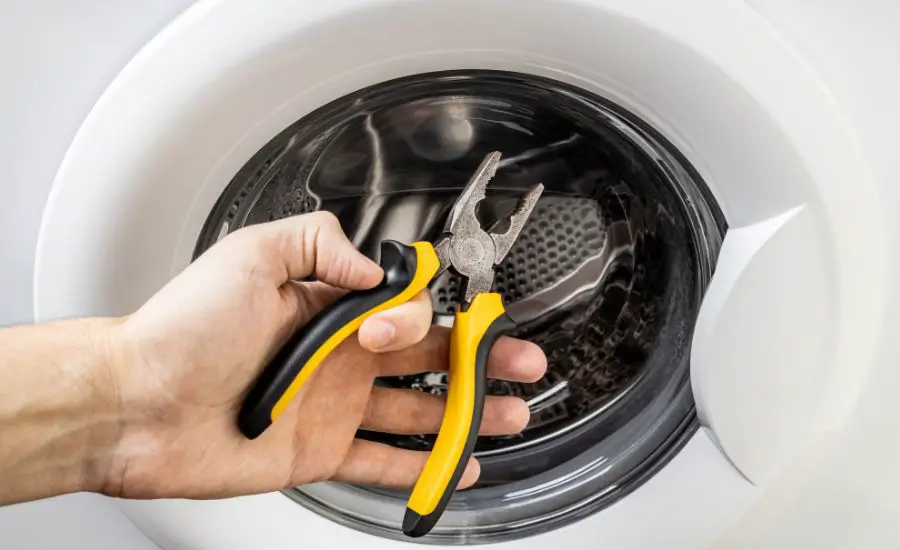
Belt issues
Belts are used in washing machines to power different parts, including the drum’s movement, when these belts experience issues, such as misalignment, wear, or corrosion, they can put a lot of stress on the interior components of the washing machine or washer which lead to the washing machine smoking inside.
Overly tight belts can strain the drive motor, idler pulley, and other components.
When a drive belt is under too much tension, it grinds against the pulleys, causing heat and friction that can lead to a faulty drive motor or cause smoke to be released.
During washing machine operation, squealing, screaming, or a buzzing noise could be a sign of a belt-related problem.
A burning smell coming from the machine can also indicate excess heat generated by drive belt friction, regularly check the condition of the belts for signs of wear, cracks, or damage.
Ensure the drive belt is tensioned correctly according to the manufacturer’s specifications, do not over-tighten the drive belt as this may strain the components and lead to the machine or washer smoking inside.
If you suspect drive belt misalignment, carefully realign the drive belt and motor pulley to ensure smooth movement, and follow the manufacturer’s guidelines for proper alignment procedures.
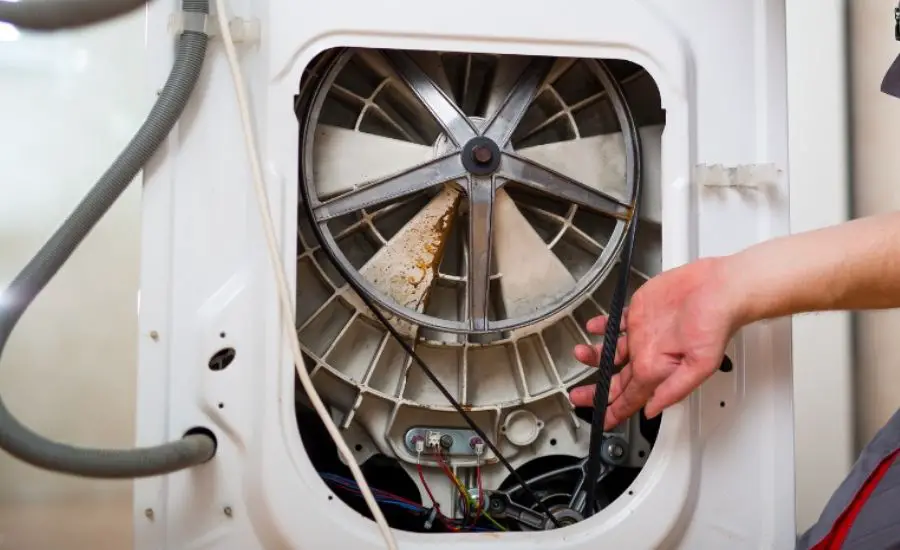
Malfunctioning drain pump
The drain pump in a washing machine is essential for removing water from the drum throughout each cycle.
This important operation can be hindered by a broken spider bearing or a blocked drain pump, which can also lead to overheating, and smoke production.
When you have a clogged drain pump or when the pump malfunctions, it may not effectively remove water from the drum after a spin cycle.
When a drain pump fails, the motor and other components of the washing machine must draw additional current to make up for the loss, this can result in electrical problems like a short circuit or power surge.
If you notice water pooling at the bottom of the drum or even on the floor after a cycle, it could indicate a drain pump malfunction.
If the drain pump motor or other components are straining due to water buildup, you might detect a burning smell, which is a clear sign of possible smoke issues
In severe cases, smoke may come from the machine, indicating an urgent need for inspection and repair.
Ensure you don’t have a clogged drain pump as a clogged drain pump can lead to drainage issues and drain pump malfunctions causing smoke in the washing machine.
It is advised to seek the advice of an authorized technician if you believe a drain pump is malfunctioning, they can precisely identify the problem and provide the best repair or replacement.
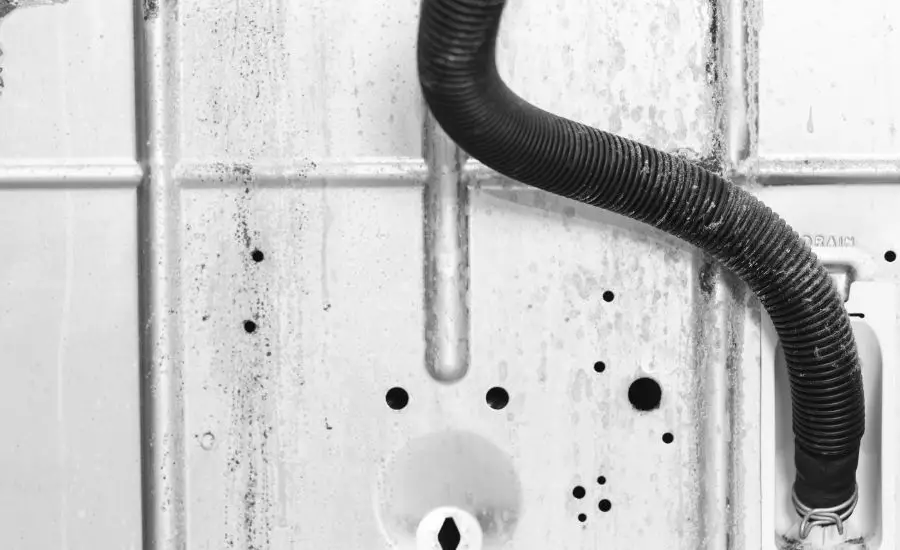
Electrical problems
A complex electrical system powers the parts and operations of washing machines, any malfunction or issue in this system could cause electrical stress and lead to smoking washing machines.
Short circuits occur when there’s an unintended path of low resistance between electrical components. This can cause excessive current flow that can make it overheat or even catch fire.
Unusual noises like buzzing, crackling, or humming can occasionally be caused by electrical issues.
A distinct burning smell is also a strong indicator of electrical problems.
If you notice any signs of electrical problems, immediately disconnect the washing machine from the power source to prevent further damage and prevent the washer from smoking inside and ensure safety.
Contact a qualified electrician or washing machine specialist to have your washing machine’s electrical system inspected to determine the specific issue and provide the appropriate solutions.
Make sure that all connections and wiring are sound and strong, if you see frayed wires or loose connections, have them fixed right away to prevent the washer from smoking inside.

Foreign objects
The washing machine’s functionality may be compromised if foreign items, such as tiny pieces of clothing, coins, or trash, accidentally make their way inside, these items have the potential to produce smoke by causing mechanical stress, and eventually causing smoke.
Foreign objects that become trapped between the drum and the walls of the washer can affect its movement.
This imbalance puts excessive stress on the motor and other components, leading to friction, heat buildup, and smoke.
To avoid smoke, check the inside of the washer regularly for foreign objects, before loading clothes into the machine, thoroughly check pockets for small items like coins, buttons, and keys.
If you discover your machine started smoking inside, or you notice smoke coming from the machine, you should consider calling a professional technician to visually inspect the washing machine or washer and resolve the problem.
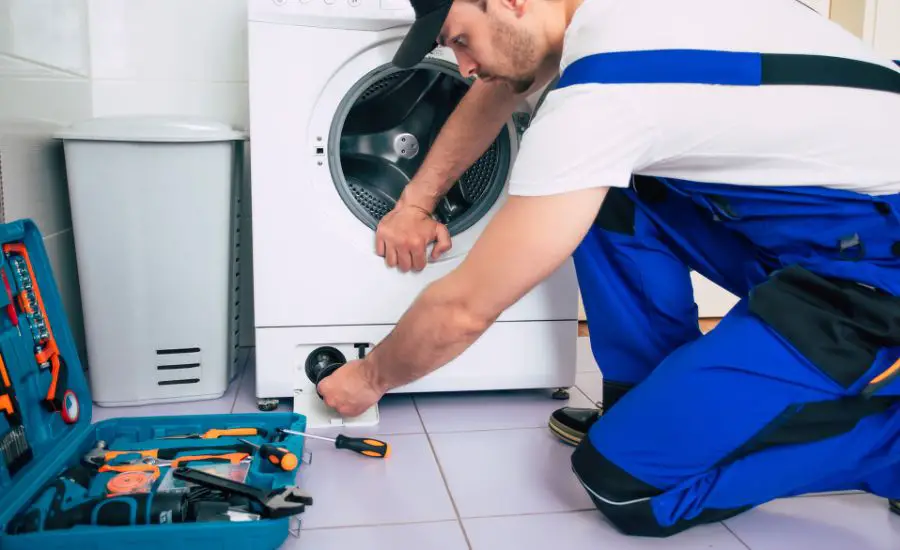
Maintenance and safety tips
- Use proper detergent: Follow manufacturer recommendations for the type and amount of detergent to avoid residue buildup.
- Inspect gaskets: Regularly check the door gasket for mold, clean the door gasket dry after each use, and keep the door slightly open to allow air circulation.
- Keep exterior clean: Clean the washing machine’s exterior regularly to avoid dust and dirt accumulation.
- Inspect for wear and damage: Regularly inspect the spider bearing for any signs of wear or damage, if you notice any issues or a broken spider bearing, consider seeking professional help to address the spider bearing problem.
- Unattended operation: Avoid leaving the machine unattended during operation, especially with a load of laundry inside.

What is the first step to take?
The first thing to do when you notice a washing machine smoking is to turn off the machine using its power button or control panel, or just disconnect the power source by unplugging the machine from the wall outlet.

When should I call a professional?
If you experience any electrical issues, such as tripped breakers, sparks, or flickering lights, you should contact a professional immediately as electrical problems can present serious safety dangers and require a professional’s expertise.

FAQ
Why is my washing machine smoking and smells of burning?
Smoking in your machine can be caused by several reasons, like electrical issues, belt issues, or a pump malfunction.
What causes a washing machine to smoke?
Smoking washing machines is likely caused by electrical issues, contact a professional if you are unsure about the root of the issue.
Why does my washing machine smell of burning rubber?
A burning rubber smell indicates an electrical issue with your washing machine, you should seek the help of an electrician or any other professional you can access.
Why does my washing machine smell like burning when it is not spinning?
A burning smell from your washing machine is likely because of an electrical issue, turn the machine off immediately after you notice this and seek the help of a professional.
Conclusion
Remember that regular maintenance, careful usage, and adherence to manufacturer guidelines all play crucial roles in the longevity and safety of washing machines, using this article as a guide, you can easily solve simple issues you encounter when using your washing machine.

